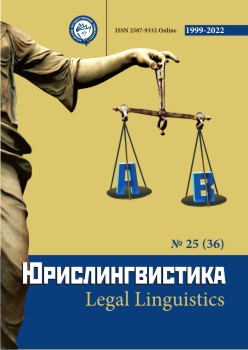Features of Headings of Legislative Texts (Case Study of the Federal Law "About Bases of Protection of Public Health in the Russian Federation")
Abstract
The paper attempts to describe the features of the headings of legislative texts as in the case of the Federal Law " About bases of protection of public health in the Russian Federation". It has been concluded that in the law there function headings of different types: headings that do not belong exclusively to the field of legal texts and can be used in texts of other types, and legal headings proper, which have specific features that are characteristic only of legal discourse. Such titles are a fairly stable type of titles within the discourse under consideration and are relatively independent structural units of the law. In this article, legislative headings proper are characterized as microtexts with legal semantics, which are relatively independent elements of legislative discourse, serving as a “code” of specific legal information and, as a result, expressing certain meanings of deontic modality (modality of duty). Based on the analysis of titles presented in this paper, it has been concluded that, despite the traditional perception of titles as non-predicative units, and therefore devoid of modal meanings, in a number of legislative titles this category can be expressed implicitly, and in some titles even partially explicated. In the text of the federal law under consideration, several separate groups of legislative titles proper are distinguished, which include: a) titles with a zero modality indicator; b) modal headings with the semantics of procedurality expressed by a verbal noun; c) proper nominative headings, the modality of which is established in relation to headings of a larger level.
Downloads
Metrics
References
Аванесян С.А. Российское законодательство в сфере противодействия коррупции, 2013. URL: https://cyberleninka.ru/article/n/rossiyskoe-zakonodatelstvo-v-sfere-protivodeystviya-korruptsii.
Александрова А.П. Модальные существительные со значением возможности в английском и русском языках / Ученые записки ОГУ. Серия: Гуманитарные и социальные науки. - 2008. - №1. - С. 47-51.
Гальперин И.Р. Текст как объект лингвистического исследования. Изд. 5-е, стереотипное. М., 2007.
Гарипова З.Р. Повтор как средство взаимодействия заголовка и текста / Филология и культура. - 2011. - №23. - С. 127-131.
Дружинская О.В. Функции и структура заголовка в «Проекте устава о тюрьмах», составленном Екатериной II / Научный диалог. - 2018. - №10. - С. 37-46.
Ивин А.А. Логика норм. М.,1973.
Культура русской речи: энциклопедический словарь-справочник / под ред. Л. Ю. Иванова, А. П. Сковородникова, Е. Н. Ширява и др. М., 2003.
Мужев В.С. О функциях заголовков / Ученые записки. Вопросы романо-германской филологии. М., 1970. - № 55. - С. 86-120.
Падучева Е.В. Модальность / Материалы к Корпусной грамматике русского языка. Глагол. Часть I. СПб., 2016. С. 19-78.
Трубникова Ю.В. Текст и его заголовок: проблема структурного и семантического взаимодействия / Известия АлтГУ. - 2010. - №2-2. С. 121-126.
Филоненко Т.А. Аттрактивные заголовки в научной речи / Известия Самарского научного центра Российской академии наук. «Педагогика и психология», «Филология и искусствоведение». - 2008. - № 2. - С. 290-296.
Copyright (c) 2022 Вера Игоревна Поповская

This work is licensed under a Creative Commons Attribution 4.0 International License.
The authors, which are published in this journal, agree to the following conditions:
1. Authors retain the copyright to the work and transfer to the journal the right of the first publication along with the work, at the same time licensing it under the terms of the Creative Commons Attribution License, which allows others to distribute this work with the obligatory indication of the authorship of this work and a link to the original publication in this journal .
2. The authors retain the right to enter into separate, additional contractual agreements for the non-exclusive distribution of the version of the work published by this journal (for example, to place it in the university depository or to publish it in a book), with reference to the original publication in this journal.
3. Authors are allowed to post their work on the Internet (for example, in a university repository or on their personal website) before and during the review process of this journal, as this may lead to a productive discussion, as well as more links to this published work (See The Effect of Open Access).











